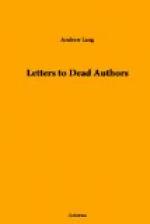This kind of writing is my pet aversion,
I hate the slang, I hate the personalities,
I loathe the aimless, reckless, loose dispersion,
Of every rhyme that in the singer’s
wallet is,
I hate it as you hated the Excursion,
But, while no man a hero to his valet is,
The hero’s still the model; I indite
The kind of rhymes that Byron oft would write.
There’s a Swiss critic whom I cannot rhyme
to,
One Scherer, dry as sawdust, grim and
prim.
Of him there’s much to say, if I had time
to
Concern myself in any wise with him.
He seems to hate the heights he cannot climb
to,
He thinks your poetry a coxcomb’s whim,
A good deal of his sawdust he has spilt on
Shakspeare, and Molie’re, and you, and
Milton.
Ay, much his temper is like Vivien’s mood,
Which found not Galahad pure, nor Lancelot
brave;
Cold as a hailstorm on an April wood,
He buries poets in an icy grave,
His Essays—he of the Genevan hood!
Nothing so good, but better doth he crave.
So stupid and so solemn in his spite
He dares to print that Molie’re could
not write!
Enough of these excursions; I was saying
That half our English Bards are turned
Reviewers,
And Arnold was discussing and assaying
The weight and value of that work of yours,
Examining and testing it and weighing,
And proved, the gems are pure, the gold
endures.
While Swinburne cries with an exceeding joy,
the stones are paste, and half the gold, alloy.
In Byron, Arnold finds the greatest force,
Poetic, in this later age of ours
His song, a torrent from a mountain source,
Clear as the crystal, singing with the
showers,
Sweeps to the sea in unrestricted course
Through banks o’erhung with rocks
and sweet with flowers;
None of your brooks that modestly meander,
But swift as Awe along the Pass of Brander.
And when our century has clomb its crest,
And backward gazes o’er the plains
of Time,
And counts its harvest, yours is still the best,
The richest garner in the field of rhyme
(The metaphoric mixture, ’t is confest,
Is all my own, and is not quite sublime).
But fame’s not yours alone; you must divide
all
The plums and pudding with the Bard of Rydal!
WORDSWORTH and BYRON, these the lordly names
And these the gods to whom most incense
burns.
‘Absurd!’ cries Swinburne, and in
anger flames,
And in an AEschylean fury spurns
With impious foot your altar, and exclaims
And wreathes his laurels on the golden
urns
Where Coleridge’s and Shelley’s
ashes lie,
Deaf to the din and heedless of the cry.
For Byron (Swinburne shouts) has never woven
One honest thread of life within his song;
As Offenbach is to divine Beethoven
So Byron is to Shelley (This is
strong!),
And on Parnassus’ peak, divinely cloven,
He may not stand, or stands by cruel wrong;
For Byron’s rank (the Examiner has reckoned)
Is in the third class or a feeble second.




